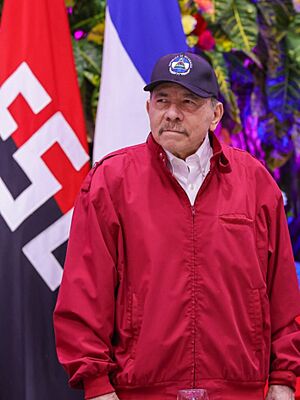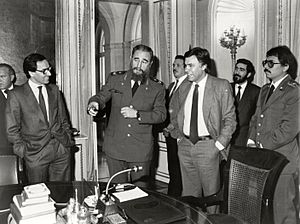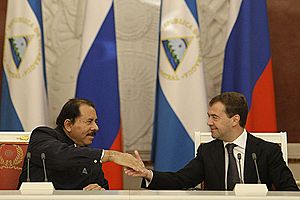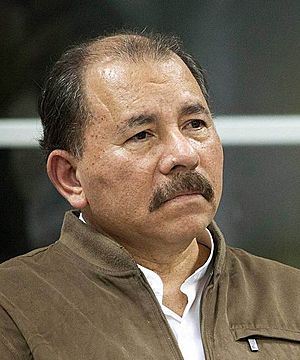Daniel Ortega facts for kids
Quick facts for kids
Daniel Ortega
|
|
|---|---|

Ortega in 2025
|
|
| Co-President of Nicaragua | |
| Assumed office 10 January 2007 Serving with Rosario Murillo Since 18 February 2025
|
|
| Vice President | Jaime Morales Carazo (2007–2012) Omar Halleslevens (2012–2017) Rosario Murillo (2017–2025) |
| Preceded by | Enrique Bolaños |
| In office 10 January 1985 – 25 April 1990 |
|
| Vice President | Sergio Ramírez |
| Preceded by | Himself (as Coordinator of the JNR) |
| Succeeded by | Violeta Chamorro |
| Coordinator of the Junta of National Reconstruction |
|
| In office 18 July 1979 – 10 January 1985 |
|
| Preceded by | Francisco Urcuyo (as Acting President) |
| Succeeded by | Himself (as President) |
| Personal details | |
| Born |
José Daniel Ortega Saavedra
11 November 1945 La Libertad, Chontales, Nicaragua |
| Political party | FSLN |
| Spouse | |
| Children | 7 with Rosario Murillo, including Juan Carlos Ortega Murillo 1 with Leticia Herrera |
| Relatives | Humberto Ortega (brother) Camilo Ortega (brother) Xiomara Blandino (daughter-in-law) |
| Awards | Al-Gaddafi International Prize for Human Rights |
| Signature | |
| Military service | |
| Allegiance | Nicaragua |
| Branch/service |
|
| Years of service |
|
| Rank |
|
| Battles/wars | Nicaraguan Revolution |
José Daniel Ortega Saavedra (born 11 November 1945) is a Nicaraguan politician. Since February 2025, he has served as the co-president of Nicaragua alongside his wife, Rosario Murillo. He was also president of Nicaragua from 1985 to 1990 and again from 2007 to 2025.
Ortega became a famous leader during the Nicaraguan Revolution. In 1979, he helped overthrow the dictator Anastasio Somoza Debayle. As a leader of the Sandinista National Liberation Front (FSLN), Ortega led a group called the Junta of National Reconstruction that governed the country. During his first time in power, he started programs for land reform, literacy, and wealth redistribution.
After losing the 1990 election, Ortega returned to power after winning the 2006 Nicaraguan general election. During his later terms, his government has been criticized for becoming less democratic. In 2018, his government used force against protesters, which led many people to leave the country. Before the 2021 Nicaraguan general election, his government jailed many opponents.
Contents
Early Life and Political Start
Childhood and Family
Daniel Ortega was born in La Libertad, Nicaragua, to a working-class family. His parents, Daniel Ortega Cerda and Lidia Saavedra, were against the government of Anastasio Somoza Debayle. Ortega and his two brothers, Humberto and Camilo, all grew up to become revolutionaries.
His family moved several times for work, eventually settling in Managua, the capital city. Ortega's father taught his sons to oppose the Somoza government and its support from the United States.
Joining the Revolution
Ortega became involved in political activities against President Somoza from a young age. He joined the Sandinista National Liberation Front (FSLN), an underground group, in 1963 when he was a teenager. Because of his political actions, he was arrested in 1967.
After being released from prison in 1974, Ortega was sent to Cuba. There, he received training from Fidel Castro's government. He later returned to Nicaragua to continue his revolutionary work. He and his brother Humberto formed a powerful group within the FSLN that helped lead to the Nicaraguan Revolution.
Ortega married Rosario Murillo in 1979. They have eight children together. Murillo is also a major political figure in Nicaragua and serves as co-president.
First Presidency (1979–1990)
Leading the Sandinistas
After the FSLN overthrew Somoza in 1979, Ortega became a leader in the new government. He was part of a five-person group called the Junta of National Reconstruction that ran the country. Soon, the FSLN became the most powerful group in the junta, and Ortega became its leader.
The new government started major social programs. They gave land to about 100,000 families and began a huge literacy campaign to teach people how to read. This campaign was recognized by UNESCO. They also improved healthcare, which helped end polio and lower child death rates.
The Contra War
In the 1980s, the United States government, led by President Ronald Reagan, opposed Ortega's government. The U.S. funded and trained rebel groups known as the Contras to fight against the Sandinistas. This led to a long and difficult civil war in Nicaragua that cost many lives.
The Sandinista government was criticized for its actions during the war. In 1982, it declared a state of siege, which limited some freedoms like independent radio stations.
1984 Election

In the 1984 election, Ortega won the presidency with 67% of the vote. Many international observers said the election was free and fair. However, the Reagan administration in the U.S. called it a "sham" and continued to support the Contras.
The war with the Contras continued throughout Ortega's presidency. In 1987, peace talks began, and the Contras started to disarm in 1989.
In Opposition (1990–2007)
In the 1990 presidential election, Ortega lost to Violeta Barrios de Chamorro. Her campaign promised to end the Contra War. Many people believe Nicaraguans voted for Chamorro because they were tired of the war and the country's economic problems.
After losing, Ortega promised to continue leading "from below," meaning his party, the FSLN, would remain powerful. During his time in opposition, Ortega ran for president again in 1996 and 2001 but lost both times.
Over the years, Ortega's political views became more moderate. He began to support some socially conservative policies and rebuilt his relationship with the Catholic Church. He also made a political deal with the rival Constitutional Liberal Party (PLC). This deal, known as "El Pacto," helped both parties stay in power and changed election laws in a way that would later help Ortega win.
Second Presidency (2007–Present)
Return to Power
Ortega won the 2006 presidential election with 38% of the vote. This was enough to win because of the election law changes he had helped pass. During his second presidency, critics say he took control of all branches of government, including the courts and the military. This has led many to call him a dictator.
In 2014, the National Assembly, controlled by Ortega's party, approved changes to the constitution. These changes removed term limits, allowing Ortega to run for president as many times as he wanted.
2018 Protests and Aftermath
In April 2018, major protests began across Nicaragua. They started after the government announced cuts to social security benefits. The government responded to the protests with force. Police and armed groups attacked protesters, and hundreds of people were killed.
The violent response was criticized by international groups like Amnesty International. Many people, including journalists and opposition leaders, fled the country. The government also shut down many non-governmental organizations (NGOs), universities, and newspapers.
Recent Elections and Co-Presidency
Before the 2021 Nicaraguan general election, Ortega's government arrested many opposition candidates who planned to run against him. This cleared the way for him to win another term.
In 2024, Ortega proposed changes to the constitution to make his wife, Rosario Murillo, the co-president. The changes were approved and went into effect on February 18, 2025, officially making them partners in leading the country.
Foreign Policy

As president, Ortega has built relationships with other socialist leaders in Latin America and around the world. He has been a strong ally of countries like Venezuela and Cuba. He has also strengthened ties with Russia. In 2008, Nicaragua became one of the few countries to recognize the independence of South Ossetia and Abkhazia, two regions that broke away from Georgia.
For many years, Ortega's government maintained diplomatic relations with the Republic of China (Taiwan). However, in December 2021, Nicaragua switched its recognition to the People's Republic of China.
The United States and the European Union have placed sanctions on Ortega's government. These sanctions were a response to the government's actions against protesters and political opponents.
Images for kids
-
Ortega with Brazilian President Luiz Inácio Lula da Silva at Itamaraty Palace in Brasília, 28 July 2010.
-
Ortega with the president of the Republic of China Tsai Ing-wen, 10 January 2017
See also
 In Spanish: Daniel Ortega para niños
In Spanish: Daniel Ortega para niños
 | Bayard Rustin |
 | Jeannette Carter |
 | Jeremiah A. Brown |





